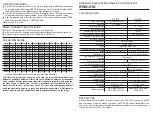
Xen IPK
Features and Specifications Manual
Features and Specifications Manual
V4 – 621
D
oc. N
o. 8201 -
Release
1.0
July 20
03
An attempt to Voice Over a Multiline/Single Line Terminal can be
denied for the following reasons:
z
Multiline Terminal is in DND (Do Not Disturb) Mode
z
Automatic Redial is activated
z
During Station Programming
z
During Incoming Ringing
z
During Internal Paging
z
During External Paging
z
During a Conference Call
z
During a Conference Call on Hold
z
Terminal is on Internal Hold
z
Terminal has a call on Internal Hold
z
All Conference channels are busy
z
During Handsfree Answerback
General
Voice Over to a Single Line Telephone is not recommended because
cross talk is inherent in the side tone of analogue telephones.
Voice Over is cancelled when the following operations are used:
z
The calling party goes on-hook.
z
The called Multiline Terminal user presses the Conference or
Transfer key. (The current call is placed on hold. The called party
receives an internal dial tone, and the calling party receives a burst
tone.)
z
The called Multiline Terminal user presses the Recall or Drop key.
(The called party seizes the same outside line. The calling party
receives a busy tone.)
An internal party who is talking with the called Multiline Terminal user
presses the Hold key. The called party receives Music On Hold. The
calling party receives a call waiting tone.
When a Multiline Terminal user performs Voice Over, the speech path
is one-way from the originator to the destination.
The Voice Over Access Code can be assigned on a Flexible
Programmable Line key or One-Touch key.
An override tone is sent to both calling and called parties.
A Single Line Telephone user can receive Voice Over.
After a Tone Override is heard, Voice Over can be set.
If a Feature Access key or One-Touch key (programmed with the
Whisper Page Access Code) is pressed, the LED lights while
responding to the page.
If a station has a Handsfree Unit programmed, the Voice Over call can
be received and answered handsfree.












































